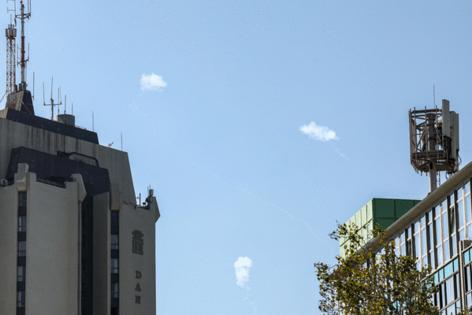Israel widens air strikes after Hezbollah fires at Tel Aviv
Published in News & Features
Israel stepped up its heaviest air attacks on Hezbollah targets in Lebanon since 2006 after shooting down the first missile ever fired by the militant group at Tel Aviv.
Air sirens were activated in Israel’s commercial capital early on Wednesday as the projectile flew over central parts of the country, the military said. Hezbollah, an organization backed by Iran, said it was aiming for the headquarters of Mossad, Israel’s external-intelligence agency, in the suburbs of Tel Aviv.
The U.S., Europe and Arab states are striving to calm the escalating fighting and prevent an Israeli ground offensive on Lebanon, which would likely entail large human and economic costs. Such a scenario could spiral into a region-wide war that risks dragging Washington and Tehran into direct conflict.
Around 570 people have been killed since Israel started a massive bombardment of southern Lebanon and the Bekaa valley in the northeast on Monday, Lebanese government officials said, a figure that included at least 50 children. More than 1,800 people were wounded. Israel broadened its targets on Wednesday, striking a town north of Beirut and carrying out an attack south-east of the Lebanese capital.
Hezbollah fired about 300 rockets at northern Israel on Tuesday, the Israeli army said. Israel Electric Corp., the country’s biggest power provider, said a “strategic” facility was targeted without causing damage. On Wednesday, the militant group fired a rocket at the northern town of Safed without causing any casualties.
Lebanon is on “the brink,” United Nations Secretary General Antonio Guterres said Tuesday at the organization’s annual summit in New York. “The people of Lebanon, the people of Israel and the people of the world cannot afford Lebanon to become another Gaza.”
U.S. President Joe Biden, in his final address to the general assembly, reiterated his call for a cease-fire between Israel and Hamas in Gaza as a way to de-escalate tension in the wider region. Hezbollah started firing rockets at Israel shortly after the start of that conflict in October, fighting in solidarity with its fellow Iran-backed group. Both Hamas and Hezbollah are considered terrorist organizations by the U.S.
The prospects of a Gaza truce any time soon look slim, however. Talks mediated by the U.S., Qatar and Egypt have been deadlocked for several months and there’s no indication of an imminent breakthrough.
Saudi Arabia warned of the “dangers of spreading violence across the region.” The foreign ministers of Egypt, Jordan and Iraq, in a joint statement, said Israel “is pushing the region toward a comprehensive war.”
Israel says its attacks on Lebanon are aimed at Hezbollah targets and meant to force the group’s fighters away from the Israel-Lebanon border area. Prime Minister Benjamin Netanyahu, who’s set to travel to New York to speak at the U.N. later this week, is trying to enable tens of thousands of displaced Israelis to return to their homes in the north of the country. A similar number of people have had to flee southern Lebanon.
The Israeli strikes on Lebanon started days after an attack in which thousands of pagers and walkie-talkies owned primarily by Hezbollah members in the country exploded. Hezbollah and Iran blamed Israel, which neither confirmed nor denied it was responsible. Israel later killed top military commanders in Beirut in a bombing raid.
Israel has killed “valuable” Hezbollah members but this won’t dent the group’s strength, Iran’s Supreme Leader Ayatollah Ali Khamenei said. The Israeli bombardment of Hezbollah “cannot go unanswered,” Iran’s President Masoud Pezeshkian said in a speech at the U.N. meeting.
Netanyahu and his generals appear to believe they can force Hezbollah’s hand with an aerial campaign alone and avoid sending troops into southern Lebanon. Still, Israeli officials say they are prepared to move soldiers across the border if they deem it necessary.
Beirut hasn’t been the target of a major bombardment, but Israel has struck it several times in the past two days in attacks seemingly aimed at specific Hezbollah commanders. On Tuesday, the military killed Ibrahim Muhammad Qabisi, head of Hezbollah’s missiles and rockets force, in one such operation.
“Any Hezbollah force that you may encounter will be destroyed,” Defense Minister Yoav Gallant told Israeli troops, adding that Israel’s forces have been hardened by fighting Hamas in Gaza for almost a year.
Israel believes that in the past week it has destroyed about half of Hezbollah’s short-range rockets, which can fly up to 45 kilometers (28 miles), and their medium-range equivalents, which can hit targets 125 kilometers away, according to an Israeli official who declined to be identified because of the sensitivity of the matter.
The hostilities are likely to exacerbate the economic and political turmoil that’s embroiled Lebanon for about five years. Inflation is running at 35%, and the country — under s caretaker government — is in default on tens of billions of dollars of international bonds.
-------
(With assistance from Omar Tamo, Dan Williams, Dana Khraiche, Brendan Scott, Alisa Odenheimer and Dan Williams.)
©2024 Bloomberg L.P. Visit bloomberg.com. Distributed by Tribune Content Agency, LLC.







Comments